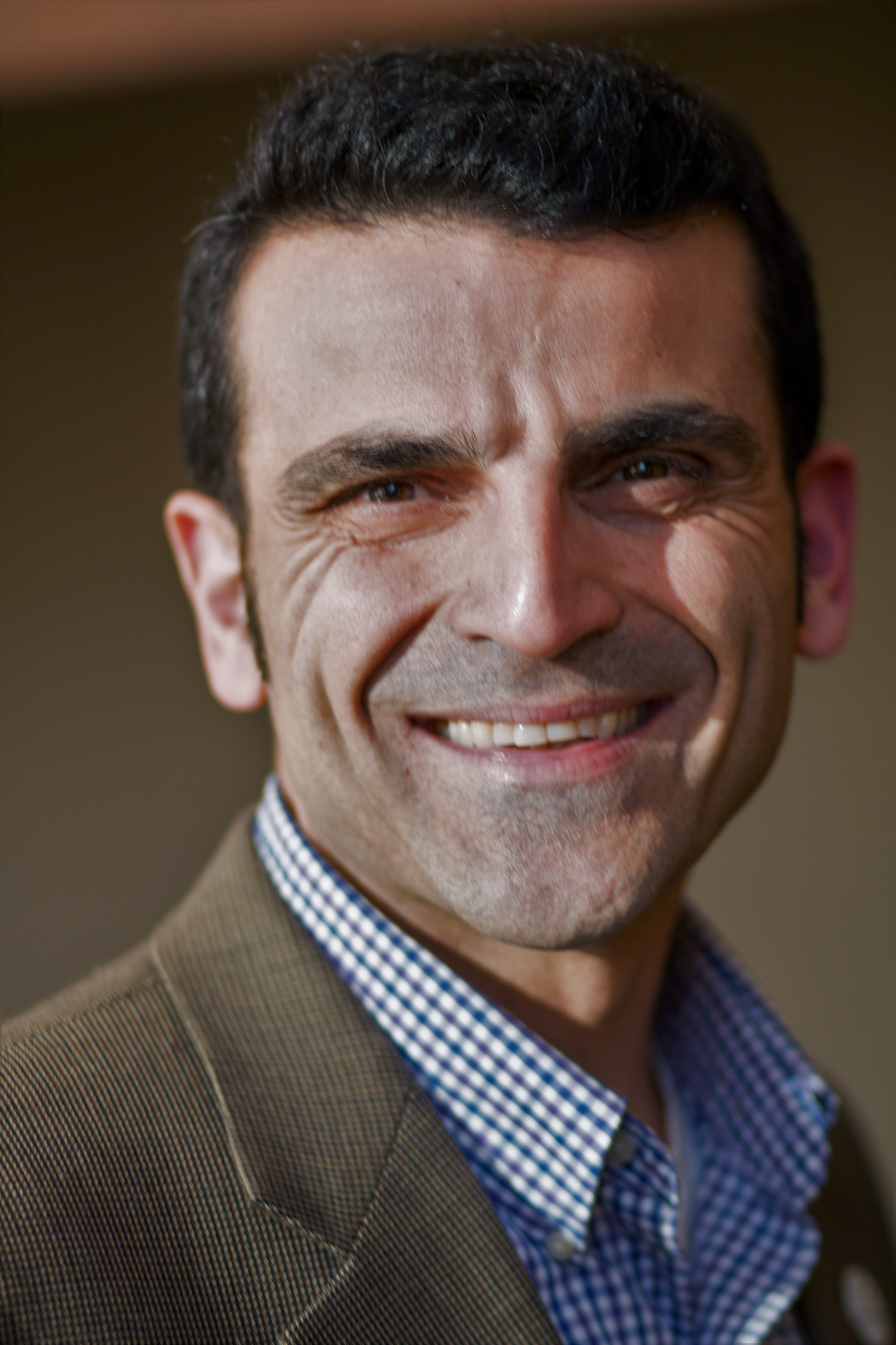Top Michigan Educator to Join ‘Teach-in’
By Brenda Ortega
MEA Voice Editor
The commitment that MEA member Rick Joseph made when he became an educator does not stop when he exits his Birmingham classroom each day. This month, it will take him to Texas.

The 2015-16 Michigan Teacher of the Year will join other top educators from across the nation at a teach-in on Feb. 17 in El Paso to protest the U.S. government’s prolonged confinement of thousands of migrant children in crowded juvenile detention facilities.
“As a teacher who is a mandated reporter, I recoil at the thought that we’re warehousing children in situations that put them in harm’s way,” Joseph said. “As educators if we observe child abuse, if we observe child neglect, we are mandated by law to report it.”
At least 10,000 children were being held in government shelters and tent cities during January, down from 14,300 a month earlier – which had marked a six-fold increase in 18 months and the highest number ever recorded. By contrast, 2,400 children were in custody in May 2017.
“The fact that we are essentially incarcerating tens of thousands of children for the simple fact that they are trying to seek asylum is abhorrent and it’s morally repugnant,” Joseph said.
Government figures indicate there has not been an increase in migrants crossing the border illegally; those numbers have been declining for two decades and hit a nearly 50-year low in 2017.
What has changed is the makeup of the migrant population approaching the southern border. More families – including pregnant women and very young children – have tried to enter the U.S. in recent months, desperate to find safety from brutal gang violence in their Central American home countries, such as extortion and death threats, rape, and murder.
“People are willing to assume tremendous risks to leave their homes and undertake a perilous journey over thousands of miles because they feel they have no choice,” Joseph said. “There is no policy that will prevent the migration of human beings who are trying to survive.”
The 24-hour teach-in later this month is being organized by 2018 National Teacher of the Year Mandy Manning, who teaches English and math to children of immigrant families in Washington state. She invited others to join her through the National Network of State Teachers of the Year.
“What’s happening to these children is they are being deprived of basic human rights and the right to a quality education,” she told U.S. News & World Report. “There are so many other groups who have been working on it longer than us, but it’s high time that educators get involved.”
Last spring, the Trump administration enacted a zero tolerance border enforcement policy that included separating children as young as infants from their parents. The policy was announced by then-U.S. Attorney General Jeff Sessions as a deterrent to future refugees.
The ACLU filed a class-action lawsuit, and last June a federal court ordered more than 2,700 children who had been taken from loved ones to be reunited with their families.
But the reunification process has taken months because of poor record-keeping and because hundreds of parents were deported without their children. Advocates say some of those children who have entered the U.S. foster care system may never see their parents again.
In the past few weeks the Trump administration has acknowledged separating thousands more children from their parents than previously announced, and admitted to having no way of tracking them to reunite families.
“The idea that a person would come to this country seeking hope and then be separated from their child—whom they see as their lifeline to the future, their dream—is simply unconscionable,” Joseph said.
Together with youngsters forcibly separated from parents, unaccompanied minors crossing the border to request asylum comprise the thousands of children living in large-scale detention centers across the country.
An Associated Press investigation in December found that 5,400 migrant children were detained in shelters housing more than 1,000 others, such as the former Walmart store now converted to a juvenile detention facility with blacked-out windows in Brownsville, Texas.
Another 9,800 youth were in facilities holding more than 100 other kids.
Their average length of stay in the private contractor-operated shelters ranges from 100 to 240 days, despite a 1997 court settlement – known as the Flores case – which limits detention of migrant children in such facilities to 20 days.
“This is happening without justification whatsoever,” Joseph said. “It’s as bad to me as what we did to the Japanese when we interned them during World War II.”
Immigrant rights advocates have blasted a Trump administration policy change that drastically slowed the process for children to be released to family members or sponsors willing to take them in – a procedural shift that led in part to ballooning numbers of children living in detention.
Few could argue that it’s healthy to institutionalize kids in a regimented environment without attachment to a loving caregiver, Joseph said.
“Children don’t have the vision to make sense of the bigger picture. They can’t understand the larger machinations of why this is happening. They just want to be safe and warm and loved and comforted. They want to be fed and clothed, and they want to be held by Mom or Dad.”
The children in prolonged detention are suffering emotional trauma that experts say could have lifelong consequences. In addition, reports of unsanitary conditions, sexual abuse, and lack of medical attention have raised concerns about physical safety, he added.
In December, two Guatemalan children who entered the U.S. with their families – a 7-year-old girl and 8-year-old boy – died in Border Patrol custody. The little boy died on Christmas Eve after being shuffled between four detention facilities in six days.
“I feel compelled to act, to help draw attention to these conditions. As a government, the United States of America is abusing children. That is the policy of this administration, and we need it to stop.”
The teach-in is calling for an end to the detention and criminalization of immigrant children and their families: “We call… for the government to protect immigrant children, in strict compliance with the Flores decree, without exception for ‘emergencies’ that have allowed children to be incarcerated for extended periods. We demand that immigrant children in U.S. custody (1) never be separated from their families, (2) be held in the least restrictive settings possible, and not in large institutional facilities…, and (3) be released to their sponsors within 20 days as required by Flores.”
Joseph teaches fifth and sixth graders at Birmingham Covington School, a 3-8 magnet school with a science and technology emphasis. He began his career as a bilingual educator in Chicago Public Schools.
His own grandfather left Syria and entered the U.S. illegally in 1912, he noted. “People are coming to this country for the same reasons that people have always come to this country. They’re seeking opportunities, and they want to make this country a better place.
“It doesn’t matter what they look like. It doesn’t matter how much money they have. It doesn’t matter what language they speak. They’re human beings, and they are our brothers and sisters, and fundamentally it’s important that we treat them with the dignity and the respect that everyone deserves.”
MEA is helping to sponsor Joseph’s participation in the teach-in.
Educators joining the 24-hour Teach-in for Freedom will deliver lessons about effects of incarceration on young people, immigration and migratory patterns around the world, and U.S. foreign policies that contributed to Central American instability, among other topics.
Educating others and standing up for children is what teachers do best, Joseph said. “I hope we can raise awareness, educate some people, and shift some policy.”
Organizers hope at least one educator from every state will join the protest at San Jacinto Plaza from Sunday to Monday of President’s Day weekend. The event will be livestreamed beginning at 9 a.m. on Facebook and YouTube.
For more information, or to learn other ways for educators and citizens to get involved, go to teachersagainstchilddetention.org.




What part of illegal don’t people understand. Is it okay to bring over guns, drugs or anything else illegally? Ignorance is being punished as it should be.
How did those children all get there???? Their parents should be prosecuted for endangering them.
As a Special Education teacher, who taught most subjects, with a major in History/Government and minors in Psychology and Economics, I have found TRUTH is paramount. Although individuals may display signs stating that “No Human Being Is Illegal.” The blatant truth is an America teacher crossing into Mexico without official permission and headed to Costa Rica, will probably before long will be picked-up as an illegal. It’s sad that Americans need to be retaught the basic definitions of legal and illegal. History supports citizenship and legal immigration. Professionals cannot permit a dislike the President to to circumvent the truth.
Personally, I believe the message, “No Human Being Is Illegal.” would have been better depicted, had the woman rewrote the sign to read, “Every Unborn Child Is Human and Deserves Protection.”